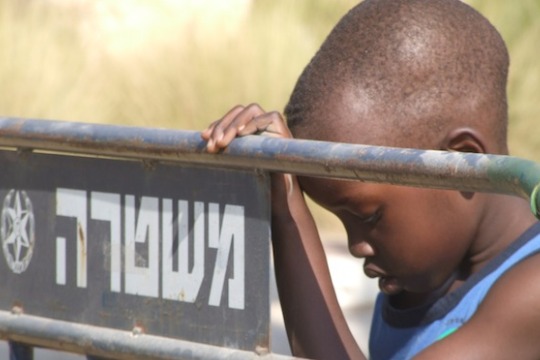When it comes to the issue of refugees, or ‘infiltrators,’ emotions often get the best of those who are defending one term or another. But facts are facts, apples are apples, oranges are oranges.
I was reminded of the above when reviewing Oren Ziv’s images of the mother and daughter being arrested at a kindergarten in the Hatikva neighborhood of Tel Aviv. Naturally, no human can deny the human emotions as evident in the photos. Some will say that the Left is exploiting such images to make those who are for deportation feel and look bad. The Left will use these photos as evidence that people who have done nothing illegal are being treated as criminals.
Hence, you need the facts.
Entering a country without legal documentation is not a crime if you have legitimate reasons for doing so. In most cases, those reasons are based on the notion of having escaped persecution.
Few would argue that the Syrians who have crossed into Turkey are not refugees, except, ironically, the Turkish government (which labels the camps which house them as “recovery centers” rather than “refugee camps”). Yet many would argue that the Africans currently in Israel, and those arriving, are not legitimate refugees. They are, their argument goes, jobseekers.
Whether it is the former or the latter, there is only one way to find out: processing those that are in Israel.
The Israeli government has refused to do so, fearing that the majority of those from Sudan and Eritrea, who make up the majority of the asylum-seeking Africans in Israel, are, according to international law, legitimate refugees. If they are confirmed as such, Israel would be required to provide them with temporary housing (a refugee camp being an acceptable standard), freedom of movement, and the ability to work. Ironically, the guidelines are in place thanks to Israel of the 1950s.
By not processing them, the Israeli government of 2012 – and thus the Israeli people – get to absolve themselves of any responsibility. The result is that these people live in a state of limbo, exploited by a right-of-center bloc seeking reelection based on, among others, instilling fear in the minds of the general public.
The United Nations High Commission on Refugees (UNHCR) defines a refugee as someone who:
…owing to a well-founded fear of being persecuted for reasons of race, religion, nationality, membership of a particular social group or political opinion, is outside the country of his nationality, and is unable to, or owing to such fear, is unwilling to avail himself of the protection of that country.
(Gender and sexual orientation are not explicitly included within the initial UNHCR definition, and their absence has been the source of some controversy. However, for many countries – not including Israel – gender and sexual orientation-based persecution fall under the “membership of a particular social group” ground.)
The UN’s Refugee Agency was initially created in response to the displacement in Europe after World War II. The idea was to ensure that there would never be a repeat of the atrocities of the 1940s when an entire people (legitimate refugees) were turned away by countries that found it domestically inconvenient to accept them.
(As a side note, the UN’s agency for dealing with Palestinians, and thus Palestinian refugees, was set up in 1949, before UNHCR. It is for this reason, among others, that Palestinian refugees maintain a different status than UNHCR refugees. That agency, UNHCR, does not for the most part deal with the protection of Palestinians. UNRWA, however, does call for the right of return of refugees to their homes. Danny Ayalon, the Israeli Deputy Foreign Minister, has repeatedly called for UNRWA to be dismantled and for Palestinians to fall under UNHCR’s classification, which, ironically, could be worse from Israel’s perspective.)
UNHCR’s mandate requires member countries to process individuals claiming refugee status. It also requires those who are found to be legitimate refugees through such processing to be granted specific rights, as part of a short-term solution. The agency then sometimes helps resettle to third-party countries those who are given such status.
Emotions aside, this is the legal framework for dealing with the Africans coming into Israel.
The other half, if Israel wishes, is to strengthen border defenses to ensure less individuals are able to enter the country without documentation. There is a moral argument to be made, but one that Israel, as a sovereign country, has the right to make. But the issue of deciding how to keep people out has nothing to do with the legal obligations of the country to those who are already here.
Those things should not be mixed by one group of people who are too eager to dismiss another group of people. Among them could be, and likely are, people who will die if sent home. That’s not an emotional statement. That’s a fact.


